This post may contain affiliate links. See my disclosure policy.
This is the BEST Mashed Potatoes Recipe! These homemade mashed potatoes are rich, creamy, buttery, and super easy to make—a must-have side dish for any holiday table!
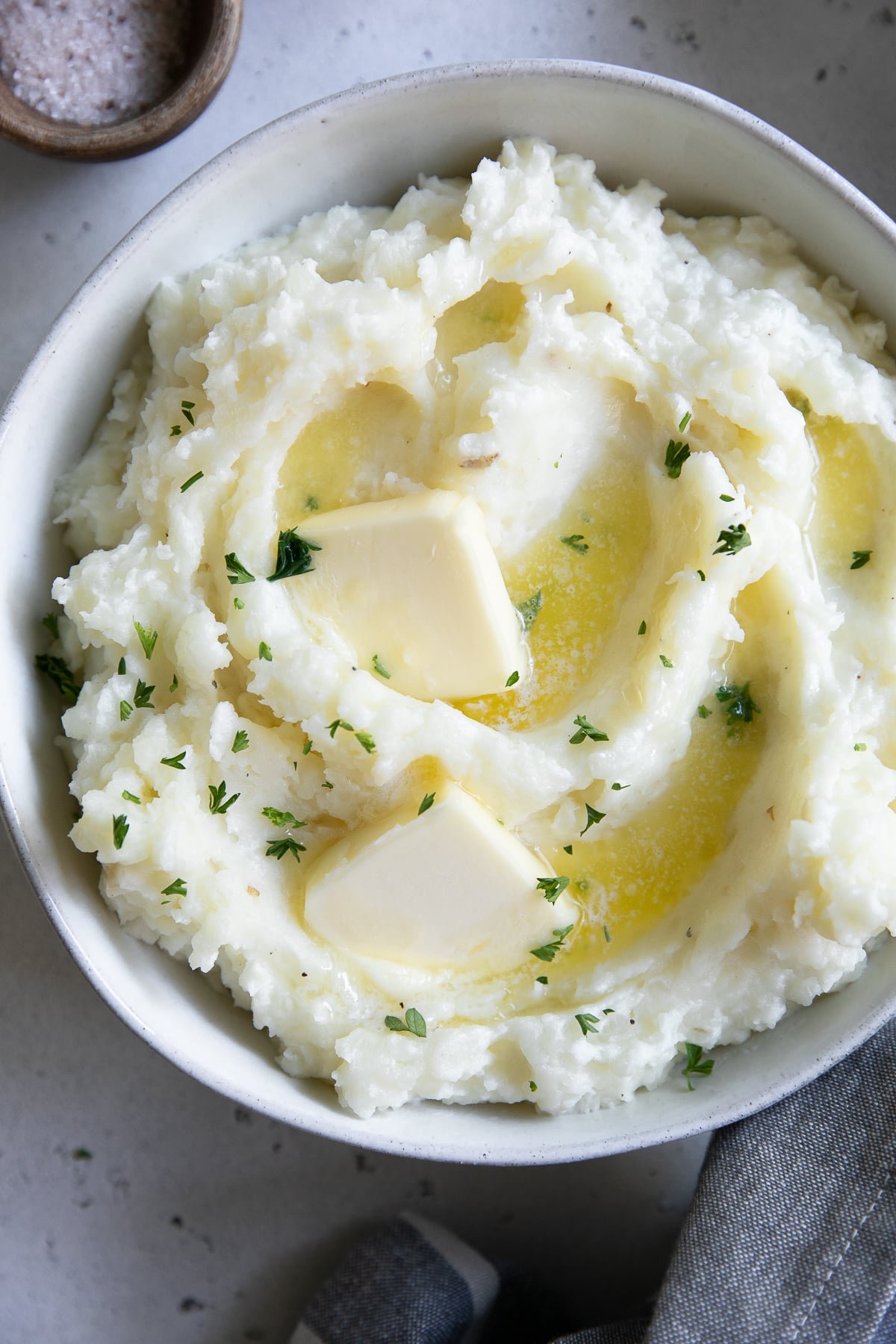
Mashed Potatoes Like My Dad Made Them
Mashed potatoes are the ultimate comfort food and universal favorite alongside roast turkey breast and homemade turkey gravy.
But there are great mashed potatoes and not-so-great ones. Today, I’m sharing how to make the BEST mashed potatoes. The kind my dad used to make (with a few modifications). These are life-changing mashed potatoes, you guys. Perfectly creamy, buttery, rich, and salty! There’s no need for anything else.
The Best Mashed Potatoes Only Need Six Ingredients
Only six ingredients, and two of them are salt and pepper! This is my version of “classic” mashed potatoes.
- Potatoes: What are the best potatoes for mashing? I recommend using russet potatoes or Yukon Golds (or a mix of both). Russet potatoes make light, fluffy, and smooth mashed potatoes when made properly. They are high starch, low moisture potatoes that absorb liquids like butter, cream, and broth well but turn gluey when overmixed. Yukon Gold potatoes, on the other hand, are naturally creamy and buttery and generally make a denser mash. They have a medium starch level, protecting them from turning gluely when overmixed (at least a little).
- Milk: My dad always made mashed potatoes with what we had in the refrigerator. This meant 2% milk. I prefer using whole milk. If calories are of no concern, heavy cream or half-and-half will give a creamier, richer flavor.
- Sour Cream: I can’t imagine mashed potatoes of any kind without sour cream. Imagine having a baked potato with just butter. The slight tanginess is a must! Full-fat sour cream is recommended.
- Butter: Salted or unsalted is up to you. I always use salted butter, but if you’re concerned about the total sodium content, you may want to use unsalted.
- Salt and Black Pepper: Mashed potatoes need salt and black pepper. My best advice is to add salt until the potatoes taste good (to you).
Variations
I love classic mashed potatoes any day of the week, but sometimes, I’ll pump up the flavor with the following additions:
- Soft cheese: Soft cheese, like cream cheese, Boursin cheese (like these Boursin mashed potatoes), mascarpone, or goat cheese, adds a luscious, velvety texture to your mash, making it extra rich. It also adds thickness and structure, preventing them from becoming too runny.
- Roasted garlic: Roasted garlic adds a mellow, nutty, slightly sweet garlic flavor. Use 1 whole bulb of roasted garlic for 4 pounds of potatoes. Check out my recipe for roasted garlic mashed potatoes.
- Fresh herbs: To balance the richness of the potatoes, include 2 tablespoons of fresh herbs. I love adding chives, parsley, and rosemary.
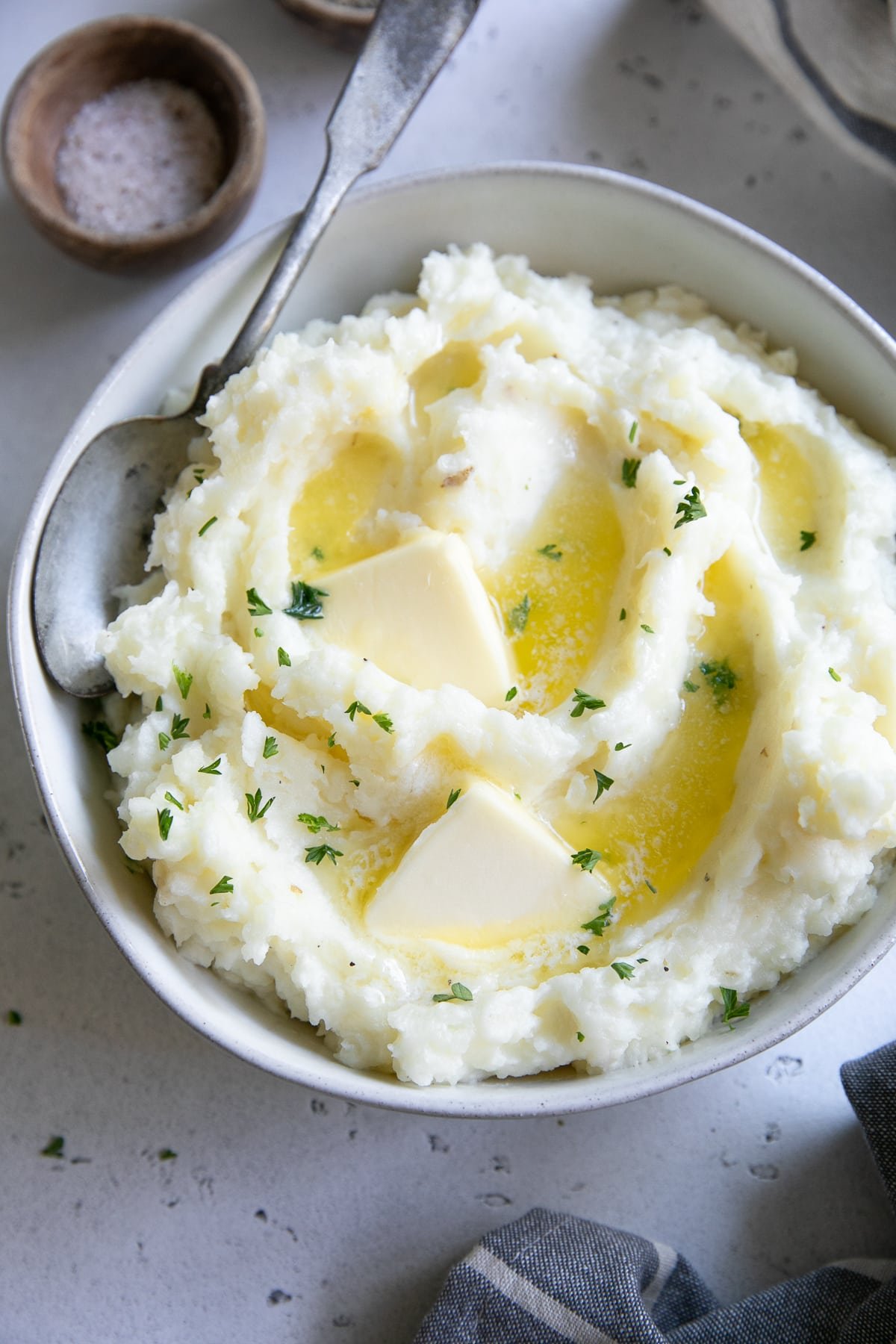
How to Make Mashed Potatoes
1. Prepare the potatoes. Peel and chop the potatoes into 1 to 2-inch chunks of equal size.
2. Boil the potatoes. Transfer the peeled potatoes to a large pot filled with cold, salted water and bring to a boil. Once boiling, reduce the heat to low and simmer, covered, until the potatoes are fork-tender, approximately 20-25 minutes (cooking time will vary depending on the size of your chopped potatoes). Cook until fork tender, then drain well. Return the potatoes to the pot.
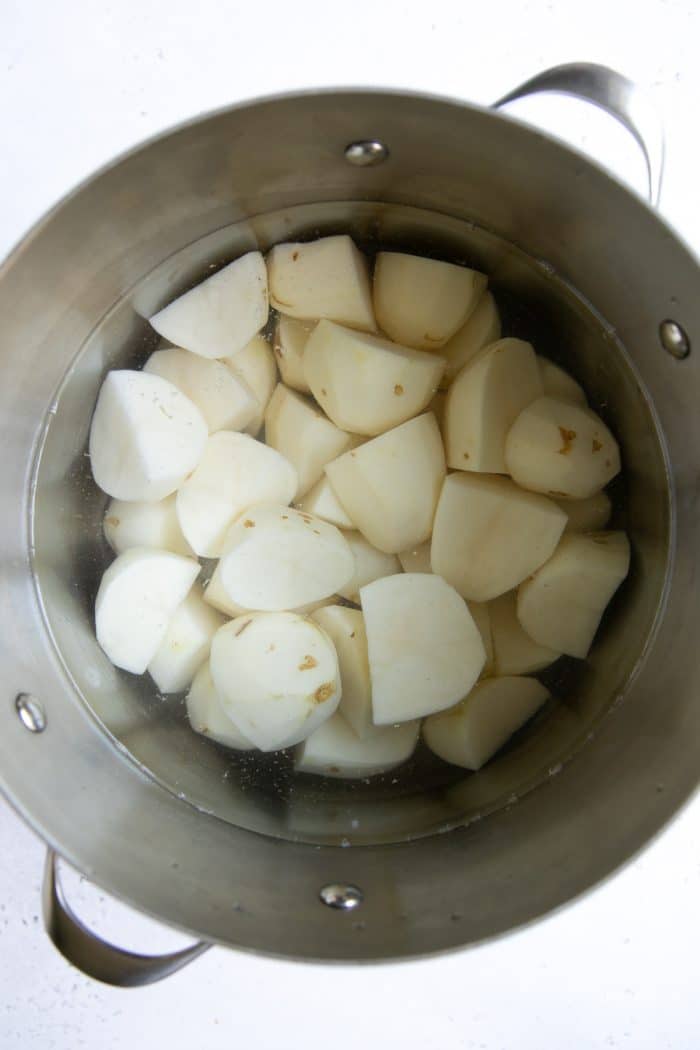
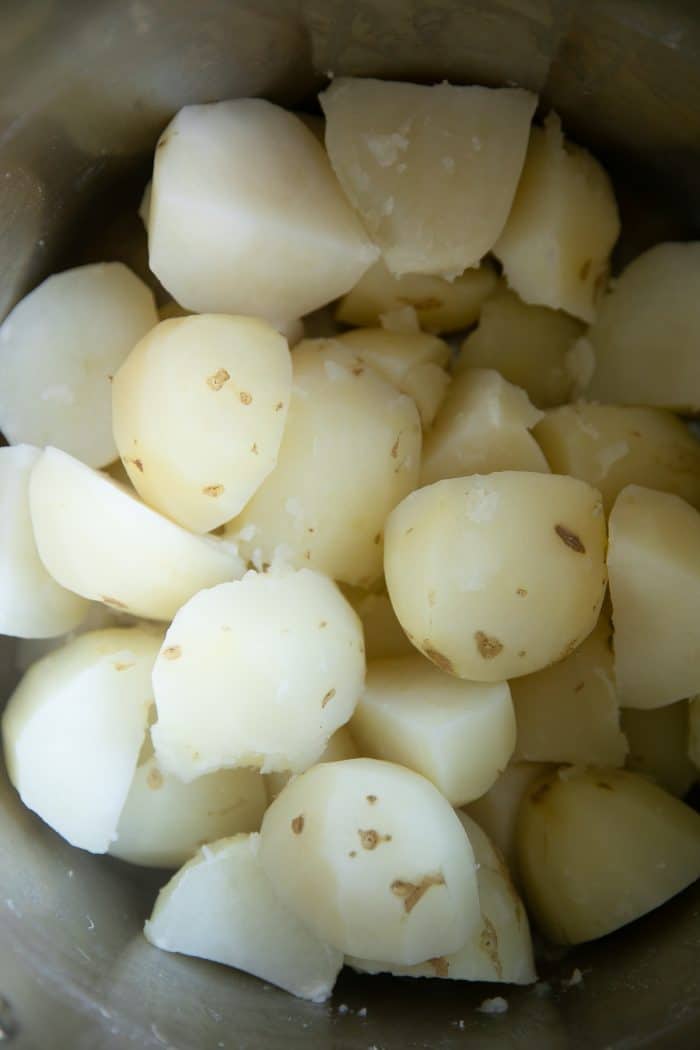

3. Warm the dairy. Add the butter, milk, sour cream, salt, and black pepper to a small pot set over medium heat and cook until hot (not boiling), stirring often to prevent milk from burning.
4. Mash the potatoes. Use a potato masher or potato ricer to mash the potatoes. Pour the heated milk and butter mixture into the mashed potatoes and continue to mash and mix until the desired texture and consistency are reached—season with additional salt and pepper to taste.
How to Keep Mashed Potatoes Warm
There are several ways to keep mashed potatoes warm, making it easy to prepare them ahead of time and keeping them warm for guests during the holidays. Tip: You may need to stir in extra butter, cream, milk, or sour cream to maintain their texture and prevent drying.
- The slow cooker: Transfer the mashed potatoes to a slow cooker set to the “warm” or “low” setting. Stir occasionally, and add a splash of milk or cream if they start to thicken.
- Double boiler: Transfer the mashed potatoes to a heatproof bowl and place the bowl over a pot of simmering water (making sure the water isn’t touching the bowl). Cover tightly with foil or a lid to retain moisture.
- Oven set to low: Place the mashed potatoes in an oven-safe dish and cover tightly with foil or a lid. Keep warm in an oven set to 200°F (93°C). Stir occasionally.
Tips and Tricks
- Start in cold, salted water. Starting with cold, salted water ensures even cooking and avoids a mushy exterior. Adding salt is an easy first step in infusing the potatoes with flavor.
- Don’t overcook. Overcooked potatoes will crumble apart and become waterlogged. After about 10 minutes, regularly check if they’re done cooking. You’ll know they’re ready when they’re fork tender but not falling apart.
- Drain thoroughly. After draining the potatoes in a large colander, I like to return the cooked potatoes to the warm stock pot set over low heat, then holding the pot by the handles, gently shake the pot intermittently for 1-2 minutes. This helps release excess steam and moisture before mashing.
- Preheat the dairy. Cold liquids cool the potatoes and can make them gluey. For best results, warm the milk, butter, and sour cream in a small pot over medium-low heat before adding them to the potatoes.
- Avoid overmixing. When potatoes are mashed too long or too vigorously, they release excess starch, resulting in gluey mashed potatoes. If you’re sensitive to this texture of mashed potatoes, I recommend mashing your potatoes by hand with a hand masher or, even better, with a potato ricer.
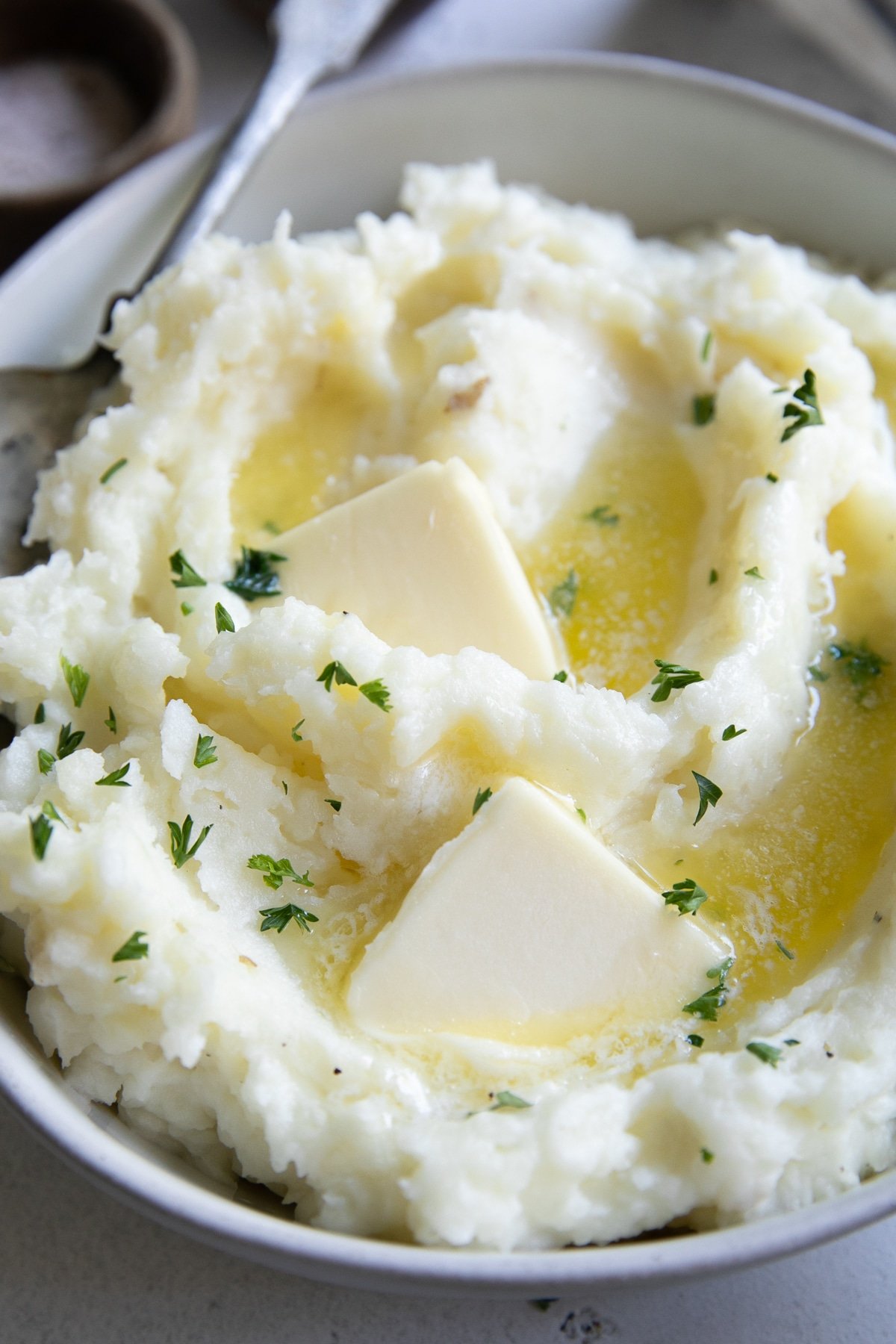
Storage and Reheating
Leftovers can be refrigerated for up to 4 days in an airtight container. To freeze leftover mashed potatoes, scoop 1 to 2-cup portions into freezer-safe plastic bags and press flat. Transfer to the freezer for up to 2 months.
The best way to reheat mashed potatoes is in the oven. Transfer the potatoes to a large baking dish and spread them evenly. Add additional cream or broth and butter, cover with foil, and warm them slowly in a preheated oven set to 350°F.
If you prefer reheating on the stovetop, try the double boiler method. Transfer the mashed potatoes to a heatproof bowl and place the bowl over a pot of simmering water (making sure the water isn’t touching the bowl). Cover tightly with foil or a lid to retain moisture.
Frequently Asked Questions
The best potatoes for mashed potatoes are starchy, low-moisture potatoes such as Russet potatoes. Buttery Yukon Gold potatoes are another popular type of potato for mash, though they are less starchy than Russets. Whenever possible, I like to make my mashed potatoes with a 50/50 blend of both.
Sure! Red potatoes, although considered a waxy type of potato, still make delicious mashed potatoes. They require a bit more mashing and mixing to get super smooth, so I’ll usually use them to make a chunkier mash.
The total time depends on how small (or large) you chop your potatoes. In general, however, once the water reaches a boil, the total cooking time will take between 15-25 minutes. Be sure to chop your potatoes into equal-sized pieces so that they cook evenly.
Yes! Baked potatoes make amazing mashed potatoes. You can even use the potato skins (if using Russet potatoes) to make potato skins for a delicious appetizer or side dish.
More Potato Recipes,
Potatoes of all shapes and colors are one of my favorite cooking ingredients, from drool-worthy fried potatoes and onions to creamy scalloped potatoes. And let’s not forget the sweet potato! These healthy mashed sweet potatoes are my favorite side dish ever!

Mashed Potatoes Recipes (How to Make Mashed Potatoes)
Ingredients
- 4 pounds Russet potatoes, peeled and cut into quarters
- 1 stick butter, plus more for topping
- 1 cup whole milk
- 1 cup sour cream
- salt + pepper, to taste
Instructions
- Prepare potatoes – Peel potatoes and chop into chunks approximately equal in size for even cooking.
- Cook potatoes – Transfer potatoes to a large stockpot and sprinkle with approximately 1 teaspoon of salt. Cover potatoes with cold water and bring to a boil over high heat. Once boiling, reduce heat to low and simmer, covered, until potatoes are fork-tender, approximately 20-25 minutes (cooking time will vary depending on the size of potato chunks). Remove from heat and drain then return back to the pot.
- Heat the milk and butter – Add the butter, milk, sour cream, salt, and pepper to a small saucepan over medium heat. Cook until hot stirring often.
- Mash the potatoes – Meanwhile, use a potato masher to mash the potatoes. Pour the heated milk and butter mixture in with the mashed potatoes and continue to mash and mix until desired texture and consistency is reached. Season with additional salt and pepper to taste.
- Serve – Transfer potatoes to a large serving bowl and top with additional butter, cracked black pepper, and chopped parsley, if desired.
Notes
- What are the best potatoes to use? Russet, Idaho, or Yukon gold. Unsure which one to use? Try a mix!
- You are going to need salt. How much exactly depends on you, but potatoes by themselves are bland. I typically salt the water that the potatoes are being boiled, add salt to the potatoes after they are drained, add salt to the butter and milk mixture, and add additional salt to taste.
- Don’t be shy about butter. I added an entire stick (equal to 8 tablespoons of butter) to this recipe, plus some on top. I know it seems like a lot, but that’s the point of creamy, buttery mashed potatoes. If you’re making this recipe dairy-free or vegan, swap out the regular butter for a vegan butter substitute. Feel free to use salted or unsalted butter.
- I used whole milk. Skim milk is too watery.
- Sour cream is super important. It’s creamy, tangy, and delicious. My dad always added loads of sour cream to their mashed potatoes, and they were incredible. Feel free to add more or less sour cream according to your own personal preference. Substitute with Greek yogurt if preferred.
Nutrition
Nutrition information is automatically calculated, so should only be used as an approximation.




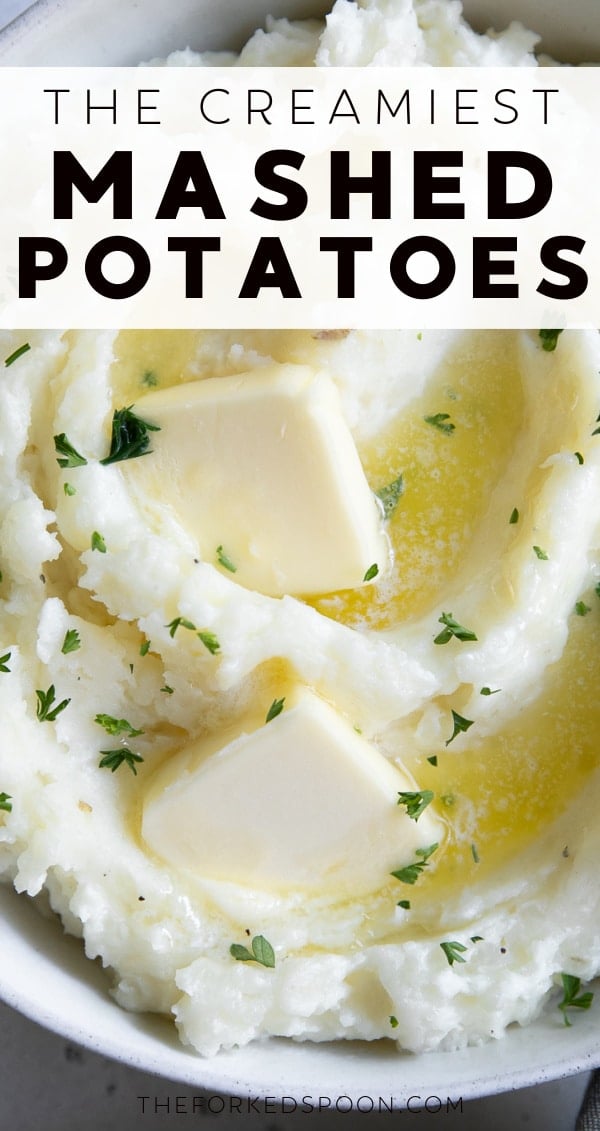

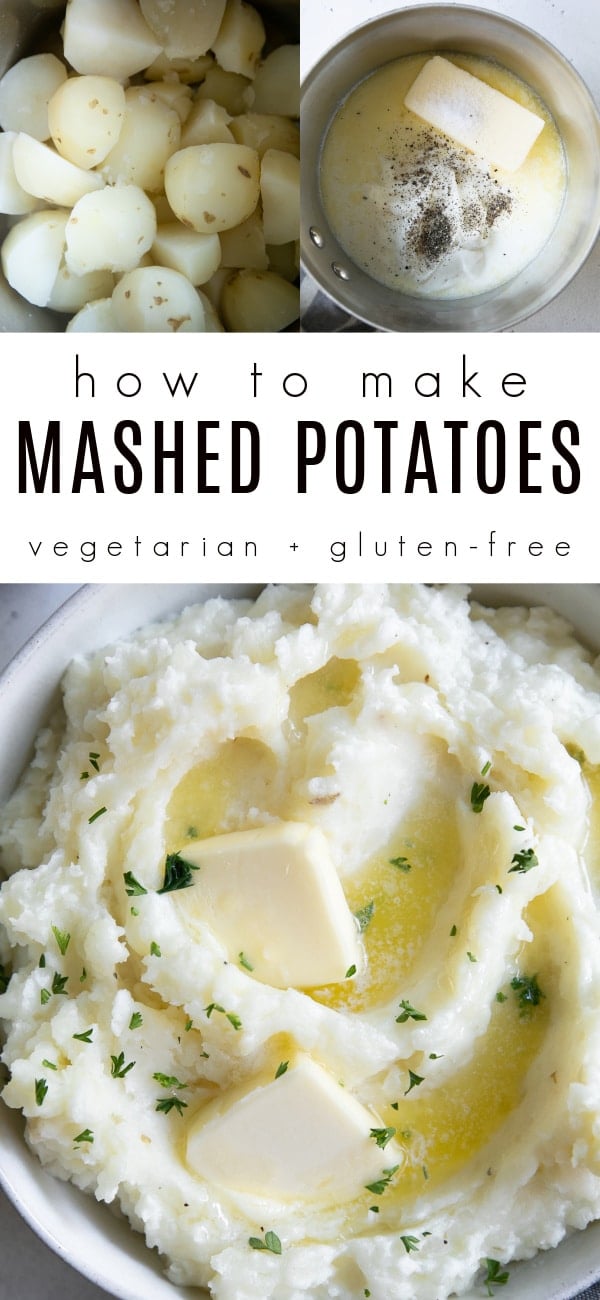


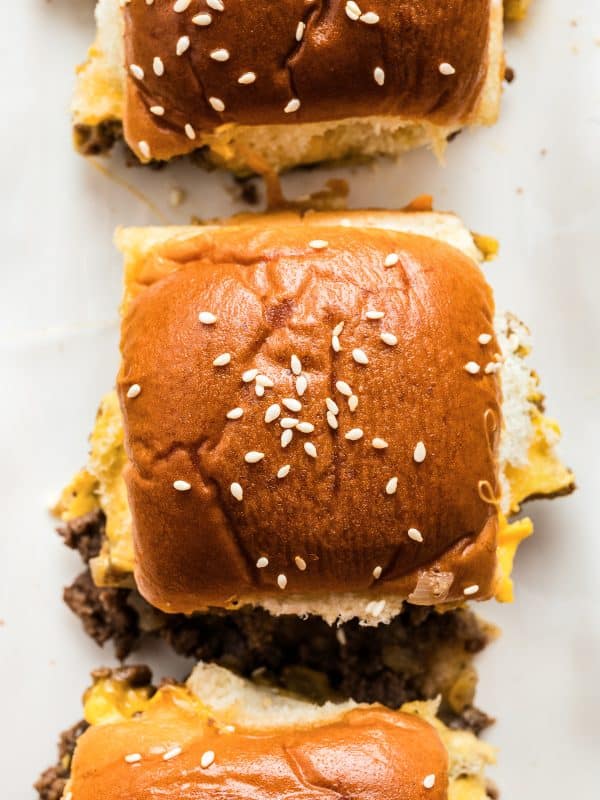
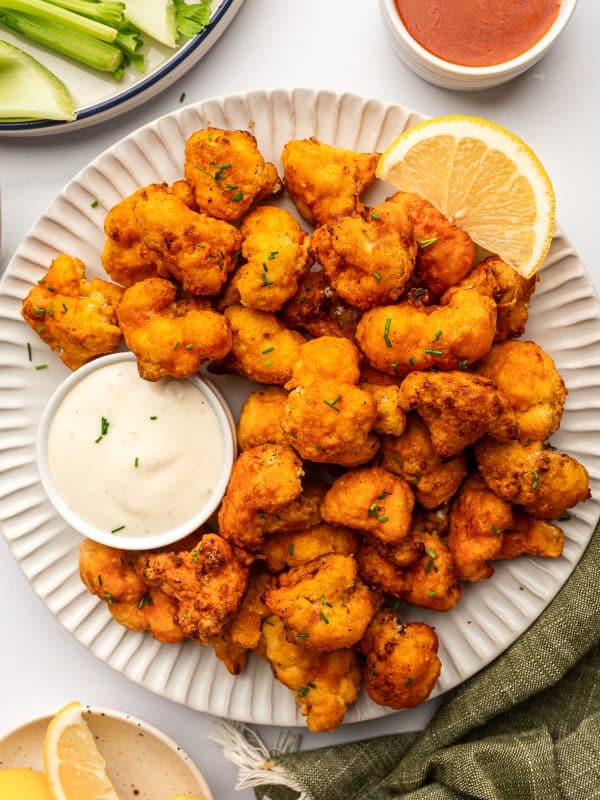
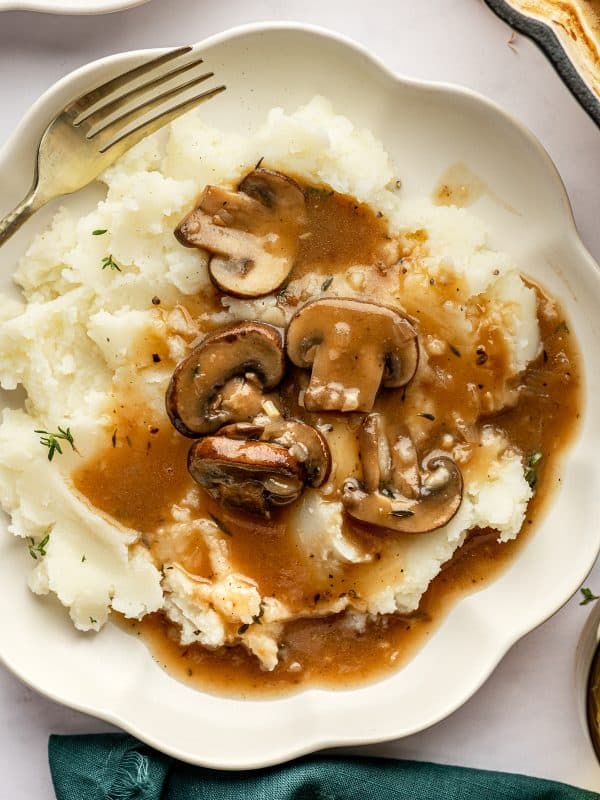
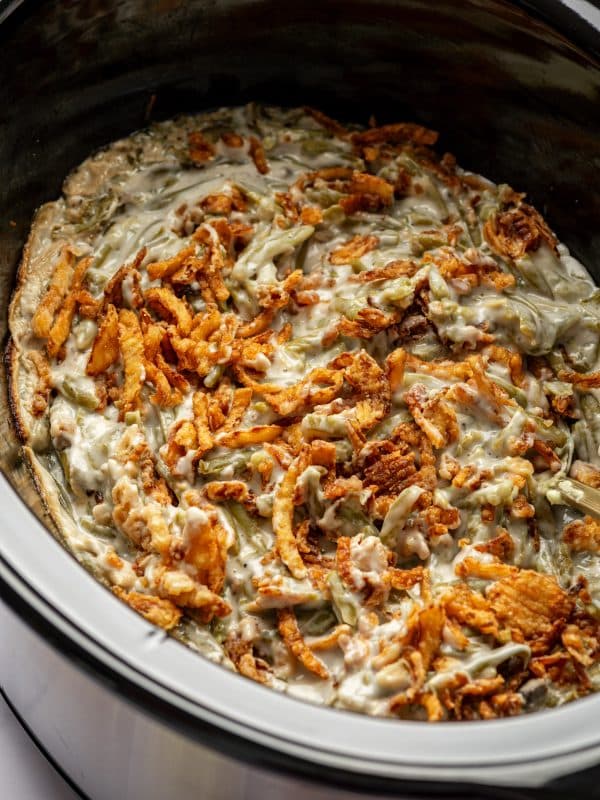








This is a great recipe, all of the essential elements of great mashed spuds! Although it’s a bit more work, using a potato river or food mill guarantees potatoes that haven’t been overworked and maximizes their fluffiness. Just using a whisk with your warmed milk, etc makes for the lightest spuds!